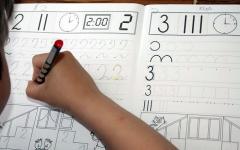Jane: What is your name and where are you from?
Sarah: I am Sarah and I`m from Canada.
Jane: What are you and how old are you?
Sarah: I`m a student and I`m twenty.
Jane: Sarah, do you have a family?
Sarah: Certainly. I have my parents and a younger sister Jennifer. She is seventeen. She goes to senior high school. I also have grandparents on my mother`s side. So, I have a big family.
Jane: What does your father do?
Sarah: My father has a café. It is our family business. He runs this café for more than twenty years. He was born in Milan and his café is a pizzeria.
Jane: How old is he now?
Sarah: My father is fifty-six.
Jane: And what about your mother?
Sarah: My mother is fifty-one and she is a painter. She is painting beautiful landscapes.
Jane: What is your mother`s origin?
Sarah: She is Irish. And she can`t forget the beauty of her native land. I`m also very influenced by her.
Jane: Do you have any relatives in Italy and in Ireland?
Sarah: Yes, I have them. My grandpa on my father`s side lives in Brescia. And my grandparents of my mother`s side live in Dublin. They are very old now and I try to visit them more often.
Jane: And what about your younger sister which is seventeen now? Is she doing well?
Sarah: Yes. She is a very clever and self-sufficing girl. I suppose she will succeed in life.
Jane: Do you like to be a senior sister?
Sarah: It is not difficult and it is very nice. My younger sister is independent and she doesn`t need to rely on me much. But I always wanted to be the youngest child in my family.
Jane: Is your relationship with your younger sister friendly?
Sarah: When I was a little girl my sister used to follow me everywhere. She always wanted to do that what I was doing. Then I didn`t want her to follow me. Now I enjoy her company and I like our conversations.
Jane: Does your sister show her respect to you?
Sarah: She enjoys being together with me.
Jane: You are happy.
Перевод
Диалог: Семья
Джейн: Как тебя зовут и откуда ты?
Сара: Меня зовут Сара, и я из Канады.
Джейн: Кем ты работаешь и сколько тебе лет?
Сара: Я студентка и мне двадцать лет.
Джейн: Сара, у тебя есть семья?
Сара: Разумеется. У меня есть родители и младшая сестра Дженнифер. Ей семнадцать лет. Она ходит в школу и учится в старших классах. У меня также есть бабушка и дедушка по материнской линии. То есть, у меня большая семья.
Сара: Чем занимается твой отец?
Сара: У моего отца свое кафе. Это наш семейный бизнес. Он родился в Милане, и его кафе - это пиццерия.
Джейн: Сколько ему сейчас лет?
Сара: Моему отцу пятьдесят шесть лет.
Джейн: А твоей матери?
Сара: Моей матери пятьдесят один год, и она художница.
Джейн: Откуда твоя мать родом?
Сара: Она ирландка. И она не может забыть красоту своей родины. И на меня она оказывает очень большое влияние.
Джейн: У тебя есть какие-нибудь родственники в Ирландии и в Италии?
Сара: Да, они у меня есть. Мой дедушка по папиной линии живет в Брешии. А мои дедушка и бабушка по маминой линии живут в Дублине.
Джейн: А что насчет твоей младшей сестры, которой сейчас семнадцать лет? У нее все в порядке?
Сара: Да. Она очень умная и самодостаточная девушка. Я думаю, что она достигнет успеха в жизни.
Джейн: Тебе нравится быть старшей сестрой?
Сара: Это не сложно и очень приятно. Моя младшая сестра независима, и она не слишком на меня полагается. Но я всегда хотела сама быть младшим ребенком в семье.
Сара: У тебя дружеские взаимоотношения с твоей младшей сестрой?
Джейн: Когда я была маленькой девочкой, моя сестра преследовала меня везде. Она всегда хотела делать то же самое, что и я. Тогда я не хотела, чтобы она ходила за мной. Сейчас я наслаждаюсь ее обществом, и мне нравятся наши разговоры.
Джейн: Твоя сестра тебя уважает?
Сара: Ей нравится проводить время со мной.
Джейн: Ты счастливая.
Приветствую всех на нашем мультимедийном уроке! На прошлом занятии разговорного курса «Так говорят в Америке» мы изучали родственные отношения, но так как родственники — это категория обширная, то в один урок уместить все семейство нам не удалось. Поэтому сегодня мы продолжим изучать название членов семьи на английском языке и другую соответствующую родственной теме терминологию. Название членов семьи на английском языке
Вы научитесь представлять своих родственников и отвечать на вопросы, которые касаются семьи. Также мы повторим лексику прошлых занятий, прослушаем аудио урок с новыми словами и выражениями, изучим таблицу с другими названиями членов семьи по-английски. А после таблицы вы получите краткую грамматическую справку об особенностях употребления английских модальных глаголов «need, like, want ».
А начнем мы, конечно, с коротенько диалога в несколько простых реплик. На сей раз репортер «Голоса Америки» Мартин Лернер, находясь за городом, отправился на торжество к семейству Кесслеров, которые проживают в сельской местности. На семейный праздник съезжаются все родственники, а Мартин тем временем поспешит пообщаться со всеми членами семьи Кесслер:
Kendra
: This is my aunt Geraldine. — Это — моя тетя Джеральдина.
Martin:
I’m Martin Lerner. Do you have a family? — Я — Мартин Лернер. У вас есть семья? (дословно: Вы имеете семью?)
Geraldine:
Of course. I have Kendra. I’m her aunt. And Karen. Karen is Kendra’s sister. — Конечно. У меня есть Кендра. Я — ее тетя. И Карен*. Карен — сестра Кендры.
Karen:
Do you have any children? — У вас есть дети? (дословно: Вы имеете детей?
Martin:
Yes, I do. I have a boy and a girl. (I have a son and a daughter) — Да, есть. У меня есть мальчик и девочка (Я имею сына и дочь)
*Карен — имя девушки, а не лица армянской национальности. Ударение падает на первый слог.
Вспомните также интересный аудио урок Знакомимся с американской кухней
Прослушивая аудио урок, следите за интонацией, а также за тем, как правильно произносятся имена родственников на английском языке. Учитесь воспринимать на слух беглую речь обычных американцев: /wp-content/uploads/2014/10/russian_english_019.mp3
Живая речь и общение — это лучший способ поправить собственное произношение и изучить разговорный английский. Поэтому используйте этот аудио урок по максимуму и старайтесь выжать из него максимум пользы для себя.
Родственные связи по-английски
Повторите слова и фразы из прошлых уроков, а также выучите новую лексику по теме «Члены семьи» на английском при помощи привычной таблицы. Внимательно прочтите каждое слово, уточните перевод, выучите все существительные, прилагательные и наречия.
|
Члены семьи |
|
|
Фразы |
|
| У вас есть семья? | Do you have a family? |
| Это моя тетя | This is my aunt |
| У вас есть дети? | Do you have any children? |
| У меня есть сын и дочь | I have a son and a daughter |
|
Существительные (Nouns) |
|
| семья | family |
| домашняя хозяйка | housewife |
| школа | school |
| фермер | rancher |
| встреча/сбор семьи | (family) reunion |
| зерно, семя | seed (corn) |
| продавец | salesman |
| бизнес | business |
|
Существительные: члены семьи (Nouns: family terms) |
|
| ребенок | child |
| Дедушка и бабушка | grandparent |
| дети | children |
| родитель | parent |
| бабушка | grandma |
| дедушка | grandpa |
| тетя | aunt |
| дядя | uncle |
|
Прилагательные (Adjectives) |
|
| любой | any |
| больше | more |
|
Наречия (Adverbs) |
|
| только | only |
| У меня только одна сестра |
I have only one sister |
Грамматическая справка:
Имейте ввиду, что после глаголов «need, like, want» чаще всего применяется неопределенная форма (инфинитив) другого глагола вместе с частицей «to»:
- I need to see her Мне нужно повидать ее
- I like to sing Я люблю петь. Мне нравится петь
- I want to meet Mr. Kessler Я хочу познакомиться с мистером Кесслером
Запомните эту особенность употребления английских глаголов «need, like, want».
А теперь получите практическую Домашнюю работу (Homework):
- Прочтите разговор репортера с семейством Кесслеров. Выучите диалог и таблицу с названием родственников. Разыграйте такую же беседу с друзьями.
- Переведите выражения на английский и запишите в рабочую тетрадь:
- У меня большая семья.
- Моя тетя Лиса живет с нами.
- Мы хотим пойти в библиотеку.
- Мои родители работают.
- Мне нравится петь.
- Я люблю читать.
FAMILY LIFE IN ENGLAND
Anna: Is family life in England very different from family life in your country,
Maria?
Maria: No, I don’t think so. But I have noticed a few differences.
Anna: Oh, such as what?
Maria: Well, for you the family is simply Mum, Dad and the children.
Anna: You have a more extended family circle, do you?
Maria: Yes, it’s quite common in Spain to have a grandmother and an unmarried aunt or uncle living in as part of the family. And we would not dream of sending an elderly relatives to an old person’s home, for instance.
Anna: You take care of the elderly relatives yourselves, I gather.
Maria: Oh, yes. It’s the family’s duty to look after an elderly parent.
***
Maria: I suppose that in England family life has changed a lot in the last fifty years, hasn’t it?
Anna: Oh yes, very much so. I think families used to be much larger. My grandmother was one of fourteen children! Very few people nowadays care to have such large families.
Maria: I suppose that’s why in those days very few women took up careers outside the home. They were too busy bringing up their children.
Anna: Yes, women weren’t as free as they are today. They often had to marry men they didn’t like and they were financially dependent on their parents or on their husbands.
Maria: I think family life is much pleasanter today because it’s freer and more informal. At least today we’re free to marry whoever we like and to take up a job, if we wish.
Anna: That’s true.
***
There are many reasons why family life in Britain has changed so much in the last fifty years. The emancipation of women in the early part of the twentieth century and the social and economic effects of the 1914-1918 War had a great impact on traditional family life. Women became essential to industry and professions. During the Second World War they had worked in factories and proved their worth; with the loss of millions of men, their services were indispensable to the nation. More recently, great advances in scientific knowledge, and particularly in medicine, have had enormous social consequences. Children are better cared for and are far healthier. Infant mortality is low. Above all, parents can now plan the size of their family if they wish.
Is it particularly interesting to note that the concept of “the family” as a social unit, and of marriage as a national, even sacred institution have survived despite many challenges.
(“To Start you Talking”)
Questions on dialogue:
Who is the dialogue between?
What problems are Maria and Anna discussing?
Are they both English?
Is it quite common in England to have a grandmother living in as part of the family?
Do you think that English people have a less extended family circle than we do?
Who takes care of the elderly relations in England? And in your country?
How has family life changed in England in the last fifty years?
Have people large families nowadays?
Why couldn’t women take up careers outside home in those days?
Who were woman dependent on?
What changes have occurred in women’s life today?
Are women in your country free to marry whoever they like?
Questions on the text:
What historic events had a great impact on traditional family life in Britain?
Have women become essential to industry and the professions?
How did women prove indispensable to the nation during the Second World War?
What recent advances have had enormous social consequences for family life?
Why are children now far healthier than they were, say, fifty years ago?
Why is infant mortality low?
What does the author say about the concept of “the family” as a social unit?
1. Speak about family life in Russia and in Great Britain.
2.Speak about family life in Russia and in Spain.
3.Speak about changes which have taken place in the family life in Russia during the last 50 years.
AMERICAN FAMILY
Belonging to a family is one bond almost everyone in the world shares, but family patterns vary from country to country. The United States has many different types of families. While most American families are traditional, comprising a father, a mother and one or more children, 22.5 percent of all American families in 1983 were headed by one parent, usually a woman. In a few families in the United States, there are no children. These childless couples may believe that they would not make good parents; they may want freedom from the responsibilities of child-rearing; or, perhaps, they are not physically able to have children. Other families in the United States have one adult who is a stepparent. A stepmother or stepfather is a person who joins a family by marrying a father or a mother.
Americans tolerate and accept these different types of families. In the United States, people have the right to privacy and Americans do not believe in telling other Americans what type of family group they must belong to. They respect each other’s choices regarding family groups.
Families are very important to Americans. One sign that this is true is that Americans show great concern about the family as an institution. Many Americans believe there are too many divorces. They worry that teenagers are not obeying their parents. They are concerned about whether working women can properly care for their children.
Families give Americans a sense of belonging and a sense of tradition. Families give Americans strength and purpose.
Families serve many functions. They provide a setting in which children can be born and reared. Families help educate their members. Parents teach their children values – what they think is important. They teach their children daily skills, such as how to ride a bicycle. They also teach them common practices and customs, such as respect for elders and celebrating holidays. The most important job for a family is to give emotional support and security.
Questions on the text:
What types of families exist there in the USA?
What is the attitude of Americans to the types of family groups?
Why is a family important to Americans?
Why do some couples prefer to be childless?
What sense do families give to Americans?
What functions do families serve?
What is the most important job for a family?
Speak on the family problems peculiar for your country.
RUSSIAN FAMILY: WHAT IS IT LIKE?
So what is it like, the family tradition?
Whose descendants are we?
What are the stories your granny used to tell?
What can family albums, letters and diaries reveal?
What is your grandfather’s name?
What is your great-grandfather’s name?
Many of Russians cannot answer these simple questions. The family tradition is lost for them. And it is one of the reasons why most people have no sense of family honor and pride.
A group of people who have the same name and sit together in front of a TV set is not yet a family. Here are some family statistics in Russia. Over 80 percent of women and about 70 percent of men marry by the age of 25. At present more than 40 out of every 100 marriages end in divorce. About 50 percent of divorcees do not want to remarry. Men remarry more often than women. Over 50 percent of divorced men remarry within the period of ten years, while only 25 percent of divorced women do so.
Many young families have material difficulties. The housing shortage is a problem of many young families. Most young people don’t want to live together with their parents after they get married, but about half of them have to do this. As a result these young people have no necessary experience in family life. They don’t know: 1) how to run a household; 2) how to manage the family budget; 3) how to bring up children.
The revival of the family starts with the restoration of its tradition. Shall we have this tradition in future or lose it, as we lost many other traditions?
Answer the following questions:
1.What family traditions are there in your family?
2.Do you spend much time together?
3.Do you spend your holidays together? Do you go to the theatre/cinema/concerts together?
4.Who does the housework? How it is divided between the members of the family?
5.Do you discuss your family budget?
6.What problems do you discuss and solve together?
7.What do you know about your grandparents and great-grandparents?
8.Do you have a family album? Are any letters and diaries kept in your family archive?
9.What do you think the future of the family is?
10.What problems have young families in our country?
11.Do you justify divorces? Why? Why not?
12.What is family for you?
Round-table discussion “The Ideal Family: What Is It Like?”
The questions for discussion are:
How many people does an ideal family consist of? How many children should there be in a family?
What are a relations between husband and wife? between parents and children?
How important are family traditions? What is important for the happiness of a family?
Divorces. One – parent homes.
Топик «Моя семья» на английском с переводом и полезными выражениями поможет вам обогатить свой словарный запас по теме. Текст про семью (my family) подойдет как для студентов, так и для школьников старших (9,10,11) классов.
My family is rather big. It consists of mother, father, little brother, grandparents, uncle, 3 aunts and 4 male cousins and me. Even if my parents, my brother and I live separately, we often visit my grandparents and get together with the whole family on holidays.
My mother is 43 and she works in a restaurant. Her work takes a lot of time, but she is satisfied with it, anyway. My father is 45 and he is an entrepreneur. He has been working in the furniture industry for more than 20 years. My sibling is only 10 years old and he goes to school. He is good at maths and English.
My family is very united. We are on good terms and trust each other. We like hosting friends and they come to visit us very gladly. My mother and I usually cook something special. I am good at baking, that’s why I like treating our guests with excuisite desserts and cakes.
My grandparents are calm and caring. My grandfather is an honoured surgeon in the country. He is 70 but he still works a lot and operates almost every day. My grandmother used to be a teacher at school and also a professor of English. My grandparents play a significant role in my education and life.
My family is highly important to me. My parents and grandparents planted a love of learning to me. They taught me good manners, correct impression of what a family is, which qualities any person should have. To my mind, family plays one of the main roles in everyone’s life. Family lays the groundwork for personality.
Перевод:
Моя семья довольно большая. Она состоит из мамы, папы, младшего брата, бабушки и дедушки, 3 тетей, дяди и 4 двоюродных братьев и меня. Несмотря на то, что мои родители, мой брат и я живем отдельно, мы часто навещаем бабушку с дедушкой и собираемся всей семьей на праздники.
Моей маме 43 и она работает в ресторане. Работа отнимает у нее много времени, но она все равно ею довольна. Моему папе 45 и он предприниматель. Он работает в мебельной отрасли уже более 20 лет. Моему родному брату всего 10 и он ходит в школу. Он делает успехи в математике и английском.
Моя семья очень сплоченная. Мы в хороших отношениях и доверяем друг другу. Нам нравится принимать дома друзей, а они охотно приходят в гости. Мы с мамой обычно готовим что-то особенное. Я хорошо пеку, поэтому люблю угощать гостей изысканными десертами и тортами.
Мои бабушка и дедушка спокойные и заботливые. Мой дедушка – заслуженный хирург страны. Ему70 лет, но он все еще много работает и делает операции почти каждый день. Моя бабушка раньше была учителем в школе и преподавателем английского в университете. Бабушка и дедушка играют важную роль в моем образовании и моей жизни.
Моя семья очень важна для меня. Мои родители и бабушка с дедушкой привили мне любовь к знаниям. Они научили меня хорошим манерам, правильному представлению о том, что есть семья, какими качествами должен обладать любой человек. На мой взгляд, семья играет одну из главных ролей в жизни каждого. Семья закладывает основу личности.
Полезные выражения и слова:
To get together – собираться, встречаться
Entrepreneur – предприниматель
Sibling – родной брат/сестра
United – дружный, сплоченный
To be on good terms – быть в хороших отношениях
To host – принимать гостей
Honoured – уважаемый, почтенный, заслуженный
to plant a love of – привить любовь к
Готовишься к ОГЭ или ЕГЭ?
- Тренажер ОГЭ и
- тренажер ЕГЭ
будут тебе в помощь! Удачи!
«Я слышала о разговорных клубах давно, но мне казалось это достаточно странным занятием. Я не понимала, о чем можно болтать с незнакомыми людьми, да ещё и на ломаном английском. Тем не менее, первая сессия меня вовлекла с первых же минут. В подобных разговорах нужен образующий центр, яркий и задорный. Шон, носитель языка, именно таким и оказался. Он в считанные секунды вовлёк всех участников в единую игру. Спасибо большое Шону, за удовольствие от общения Спасибо Ирине, за очередной толчок из зоны комфорта в приятное барахтание в незнакомой среде Я занимаюсь индивидуально с австралийским учителем, но групповой опыт важен и нужен наравне с другими видами практики. Я с удовольствием продолжу. Спасибо организаторам»
Екатерина из Москвы, 33 годаМилана Богданова
Михаил Чуканов
Наташа КалининаОнлайн- курс : «Учимся читать на английском с удовольствием» : « Спасибо всем создателям курса за эту возможность!!! То, что произошло — это очень значимое событие для меня — я действительно начала читать (и продолжаю это с удовольствием) на английском языке! Это потрясающе, потому что я боялась близко подойти не то, что к книгам на английском языке, мне даже просмотр небольшой информации, англоязычных сайтов вызывал существенные затруднения.»
Милана Богданова
Эля Алиева«У меня всегда были убеждения, что чтение книг на чужом для меня языке это сверх невыполнимая для меня задача, но благодаря опытным преподавателям и моей чудесной группе поддержки (участники обучения с кем я была в группе), я открыла для себя уникальную возможность читать и еще получать огромное удовольствие от чтения. »
Михаил ЧукановОнлайн-курс «АНГЛИЙСКИЙ ЧЕРЕЗ САМОРАЗВИТИЕ»: « Я больше стал применять английский для практических задач. Например, недавно сам выбрал на лондонском сайте объявлений предложение о продаже гитары, сам вел переписку с продавцами и купил легендарную гитару у одной английской музыкальной семьи в Лондоне. Мы даже посидели-пообщались с ними «за жизнь». Для меня это маленькая победа! »
Ольга ПашкевичОнлайн-курс «Учимся читать на английском с удовольствием»: «Серьезно, вот скажи мне кто еще пару месяцев назад, что я буду каждый вечер посвящать чтению на английском, я бы очень сильно удивилась. Раньше для меня это была скорее пытка, чем удовольствие, скорее необходимость, чем выбор.»








